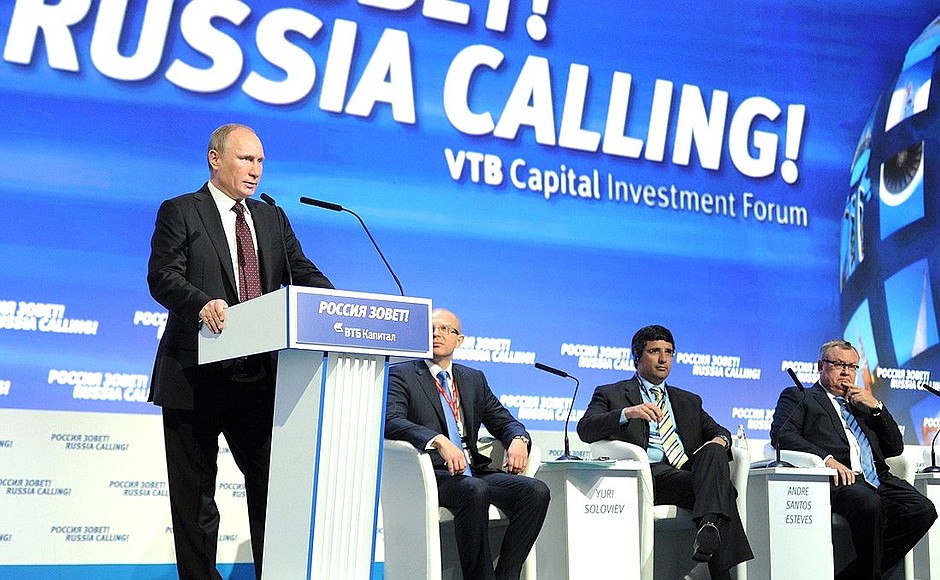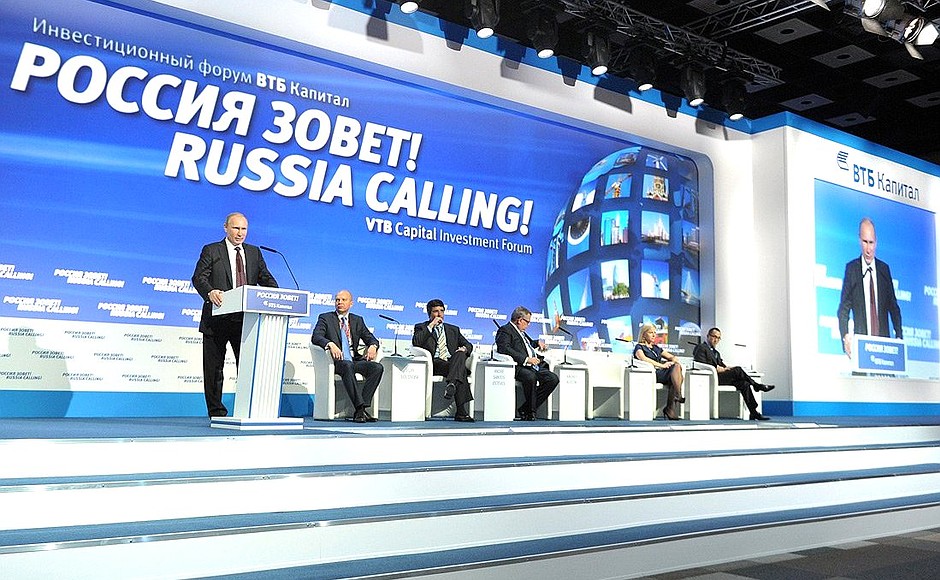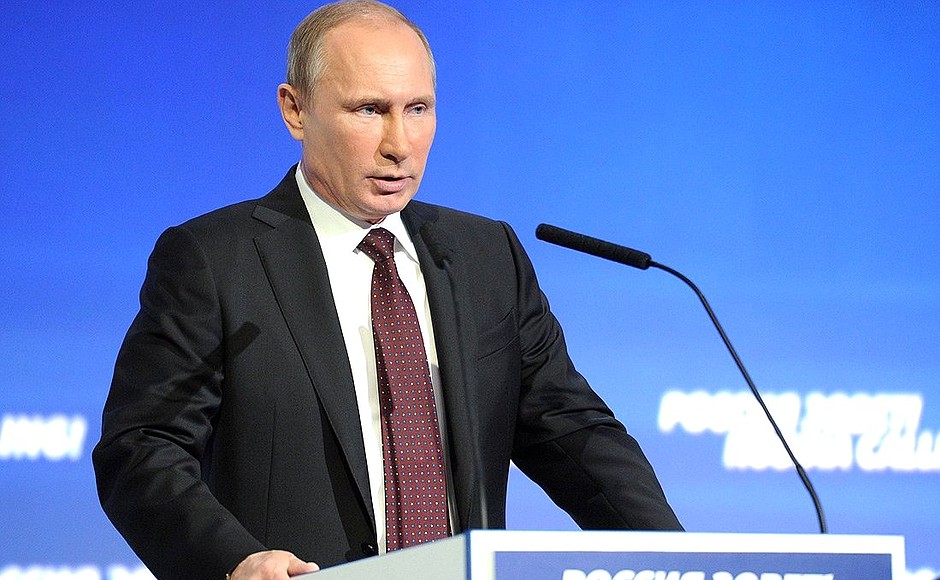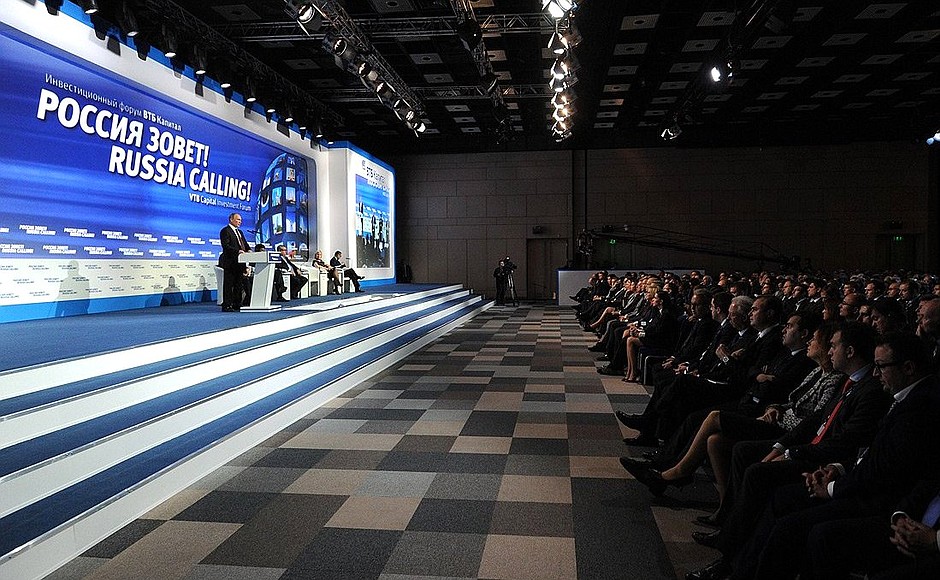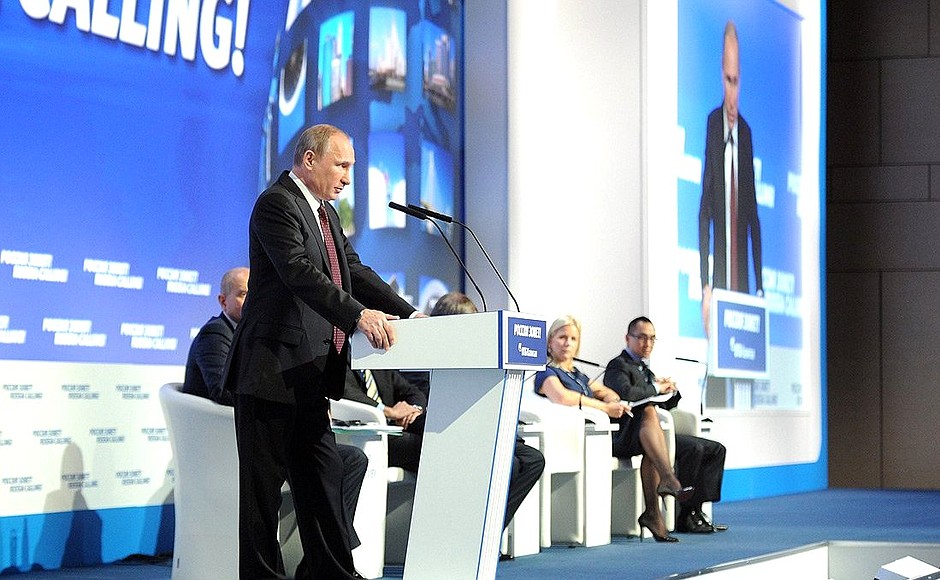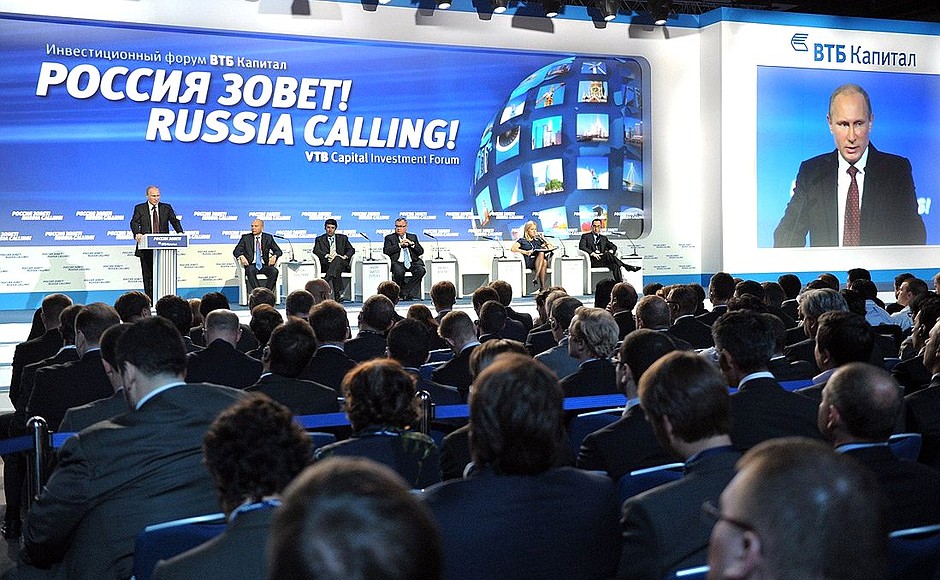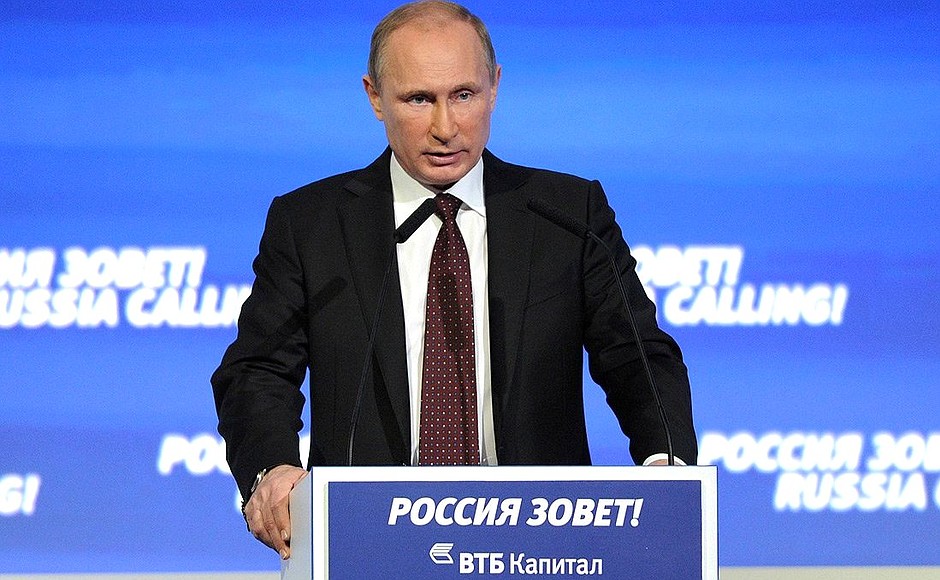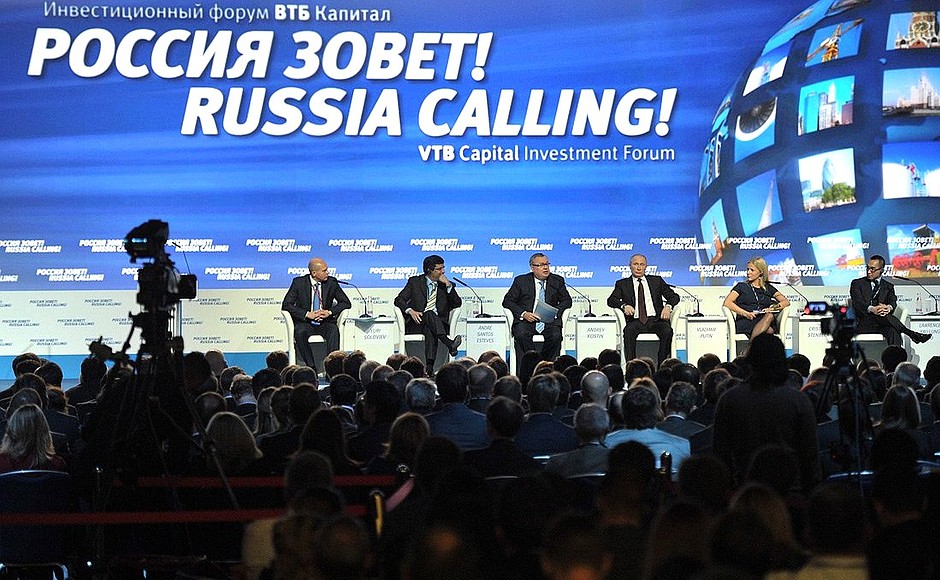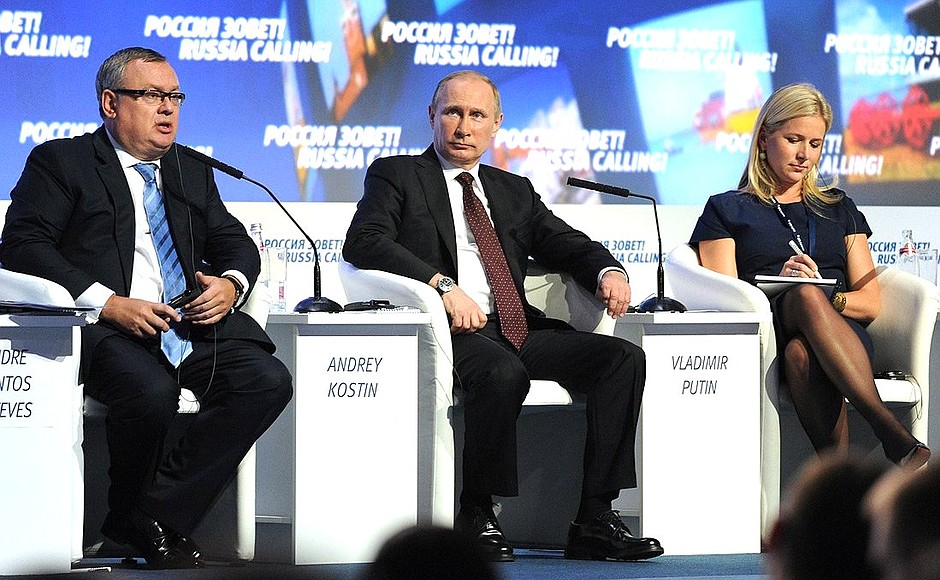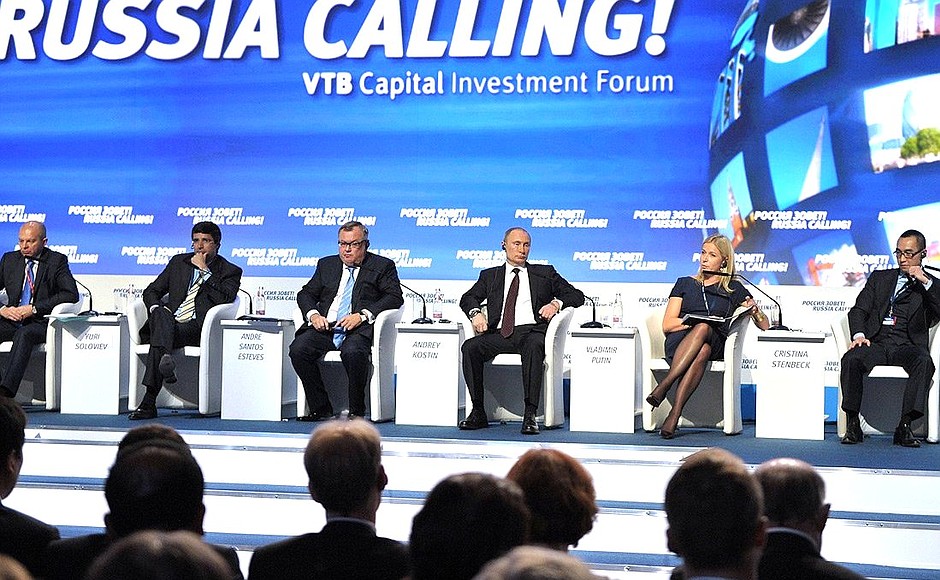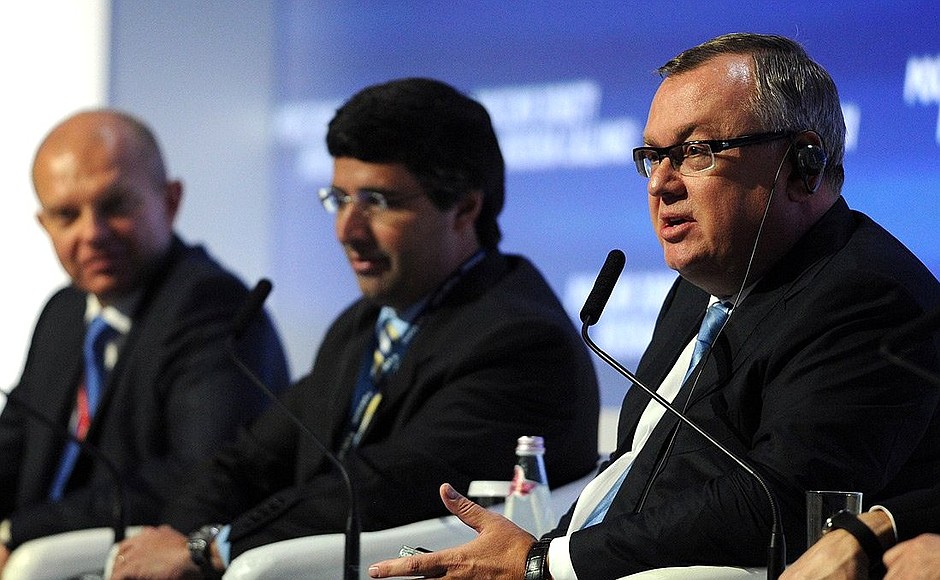The “Russia Calling!” Investment Forum provides a platform for developing dialogue between Russian business and the international investment community. Prominent political and business community figures from around the world are taking part in the event. The forum is examining development trends in the Russian and global economies and the state’s role in an investment model for growth.
Excerpts from transcript of meeting with participants of the Russia Calling! Investment Forum
President of Russia Vladimir Putin: Good afternoon friends, ladies and gentlemen.
I know you had a very active discussion yesterday.
I want to welcome you all to this forum organised by VTB Capital. The forum has already become a regular event and I think it is very useful. Here, you can discuss the biggest issues concerning the Russian and global economies in an open, professional and friendly manner.
This year’s forum is taking place only a month after the G20 summit in St Petersburg. Let me say a couple of words first about the summit’s results.
”Improving the business climate is the key to making the economy more effective. To achieve this aim, we have launched, together with the business community, the national business initiative. We are now seeing some progress in access to the energy supply network, in tax administration and in real estate registration procedures.“
The general conclusion is that the acute phase of the crisis is over and the current risks are more or less under control. However, hopes for swift recovery in the global economy, if anyone had them, are illusory. The crisis that the current economic model is going through is structural and thus long-term in nature. Practically all countries are experiencing a slowdown in growth rates, including Russia, of course.
We must coordinate our actions and find new sources of development. The Russian presidency made this the basic approach at the G20 summit in St Petersburg, and this strategy was cemented in the final action plan that the summit produced.
The G20 countries succeeded in finding mutually acceptable solutions to practically all of the complex issues before us. These solutions are equally important for the international community and for Russia.
A consensus has been reached on combining measures to stimulate economic growth with fiscal consolidation. The specialists know that reaching a consensus on these two different areas of action is quite difficult if at all possible. But the summit participants reached an agreement at any rate that we will proceed based on these two seemingly different vectors of action.
Medium-term targets have been set for each country in reducing budget deficits and carrying out structural reform. This involves labour market regulation, taxation, developing human capital and modernising infrastructure.
Financing investment was a big priority for the current presidency and a new theme for the G20. A specific G20 roadmap for improving the investment climate and encouraging long-term investment was drafted and is already being implemented.
The key issue at the summit was reforming tax policy in order to fight tax evasion, including through the use of offshore zones and schemes. We adopted principled decisions on this matter in St Petersburg, approved the action plan for combating erosion of the tax base and tax avoidance, and agreed on standards for exchanging information for tax purposes.
Another important result was that the G20 reiterated its support for the multilateral trade system. We agreed to extend until the end of 2016 our countries’ commitment to limit protectionism in global trade. I can say that it was no easy task to persuade all of the summit participants to agree to this decision.
”The state authorities themselves must set the example when it comes to effectiveness. This concerns companies with state participation, use of state assets, and the budget process at all levels, from federal to municipal.“
We also approved commitments to making regional trade agreements more transparent and bringing them into line with the World Trade Organisation’s principles.
Judging by our G20 partners’ reactions and the response from experts and the media, we can state confidently that the St Petersburg summit was a success.
As we saw it, the process of coordinating and approving the measures needed to make the global economy more stable went ahead in a regular and friendly fashion at the G20 summit, and this gives us confidence we do have a chance of making the global economy more receptive to long-term growth factors.
At the same time, we realise that each country will carry out its own national strategy and look for its own answers to the challenge this global structural crisis brings, based on its existing possibilities, resources and specific internal problems.
One of Russia’s specific problems, one of the core challenges it has to address, is low effectiveness. In terms of the size of our GDP we are close to becoming Europe’s biggest economy and the world’s fifth-biggest economy. Last year, according to OECD data, Russia’s GDP in purchasing power parity terms came to $3.373 trillion. Germany’s GDP was $3.378 trillion. We are clearly just behind Germany now for this indicator. Our per capita GDP and consumption levels are similar to a number of the European Union countries.
But this is where the good news stops. We are more than double behind the developed economies in labour productivity. This gap between consumption levels and effectiveness is unquestionably dangerous. Living off natural resources at our future generations’ expense, spending a fortune we did not earn and dividing up this unearned fortune cannot be sustainable and long term.
This is an unacceptable road for a country that has set big goals, lives in an open economy and therefore must compete for investment and technological leadership on global markets and give its citizens better living standards and conditions for realising their potential.
”In terms of the size of our GDP we are close to becoming Europe’s biggest economy and the world’s fifth-biggest economy. Our per capita GDP and consumption levels are similar to a number of the European Union countries. But we are more than double behind the developed economies in labour productivity. This gap between consumption levels and effectiveness is unquestionably dangerous.“
Today’s labour productivity growth rate – it was 3.1% in 2012 – is not enough to close the gap in effectiveness with the leaders and essentially means keeping the economy as it is, that is, keeping its structural and raw materials bias in place. Labour productivity in Russia needs to grow by 5–6% a year, or double the rate we have today. This is the only way to swiftly close the effectiveness gap. I am confident that we can do this.
There are entire Russian regions that have already achieved labour productivity growth rates of more than 10%. Here are some of the figures for 2011, since the 2012 gross regional product figures are not completely ready yet. In 2011, in first place on the labour productivity index, considerably exceeding the national average, was Kaluga Region at 113.1%, followed by Orel Region at 112.3%, Tambov Region at 111.9%, Voronezh at 111.4%, Arkhangelsk Region at 110.6%, and Belgorod Region at 110.4%. Such results are possible when greater effectiveness and creating quality new jobs are a genuine priority, real goal and the purpose of development, and not seen as some kind of optional, sideline burden or secondary task.
Greater effectiveness would change the labour market’s quality and the employment structure. Instead of old, obsolete and sometimes poorly paid jobs, we would be able to give millions of our people high paying and promising jobs in modern sectors, in small and medium-sized businesses, and in the non-raw materials sectors. We would help people to raise their qualifications and learn new skills. It is this constructive approach that must be at the core of the Government’s and the regional authorities’ work. Circumstances cannot be turned into a pretext for not carrying out this work.
But at the same time – I cannot but mention this, though it is something we will look at in greater detail at our meetings and discussions with the Government – only two of the state programmes the Government has drafted mention measures and give specific indicators for creating quality jobs.
So what exactly should we do? Above all, the state authorities themselves must set the example when it comes to effectiveness. This concerns companies with state participation, use of state assets, and the budget process at all levels, from federal to municipal.
The Government submitted the draft federal budget to the Parliament earlier this week. Ineffective spending and programmes that were not producing sufficient results have been curtailed. Spending for social commitments has been maintained, and in a number of cases, not all, but a number, has been increased. Additional funding has been earmarked for supporting the regions, including for developing the Far East and the Baikal region. In other words, we are concentrating our resources on the priority goals.
Let me say a few words about the decision to freeze infrastructure monopolies’ tariffs. This is not only about creating conditions for development throughout the entire economy, but sends a clear signal to the state-owned companies that they need to make themselves more effective.
”Labour productivity in Russia needs to grow by 5–6% a year, or double the rate we have today. This is the only way to swiftly close the effectiveness gap. I am confident that we can do this.“
Let me stress here that state-owned companies’ investment programmes must be carried out, but in the current conditions this has to be done by bringing down internal costs, and these companies must work as actively as possible to cut such costs.
Holding the tariffs in check also pursues the objective of bringing down inflation. Non-monetary factors have had a big impact on price rises over recent years. Inflation will be at around 6% this year. Next year though, we have a real opportunity to get inflation down to under 5%. If we succeed in achieving this rate, it will be the first time in the last 20 years.
Colleagues, improving the business climate is the key to making the economy more effective. To achieve this aim, we have launched, together with the business community, the national business initiative. We are now seeing some progress in access to the energy supply network, in tax administration and in real estate registration procedures.
But we must admit that these are still just the first modest steps. Some ministries and agencies often fail to see improving the business climate and administrative procedures as priorities in their work. We can no longer delay the fundamental decisions in this area; at least, we cannot push them back any further than 2015. I think that all of the measures to improve the business climate set out in the roadmaps we drafted should be carried out soon, over the next two years. I ask the Government to approach the task with this timeframe in mind.
Let me add that implementing the roadmaps does not mean that after 2015 we can consider the work fully completed. Of course, this will not be the case. Improving the business climate is a constant process because other countries and the world in general are not standing still. If we want to be competitive in the battle for investment, we must not only introduce the best world practice here, but also to take action to put us a step ahead.
Let me say again that much here depends on the regional authorities. We have regions that offer a genuinely comfortable environment for doing business, in just a short time have successfully raised billions in investment, including foreign investment, and have created tens of thousands of quality, high-paid jobs.
Let me give a few concrete examples. Four Russian regions have created more than 55,000 new jobs over the recent period. Of these, 16,000 are in Tatarstan, more than 14,000 each in Belgorod and Chelyabinsk regions, and 11,000 in Lipetsk Region. Kaluga Region, which I mentioned before, has created 3,000 new jobs in 2013, and 6,000 new jobs were created in Sverdlovsk Region. Five new plants have opened in Tyumen Region, and another eight plants – new businesses – are planned to open by the end of the year.
As far as attracting investment goes, I can cite the example of Ulyanovsk Region, where the total investment portfolio comes to 194.6 billion rubles. Projects are underway there with companies such as Bridgestone (tyre manufacture), Hempel (paints and varnishes), Schaeffler (car parts) and Gildemeister (machine-tool building). These investment projects will create nearly 36,000 new jobs. We want to see these kinds of results from all the regions, including the Far East regions.
”Living off natural resources at our future generations’ expense cannot be sustainable and long term. This is an unacceptable road for a country that lives in an open economy and therefore must compete for investment and technological leadership on global markets and give its citizens better living standards and conditions for realising their potential.“
The management team working on developing the Far East regions recently got a lot of new faces and has already begun its work. Creating the best conditions for investment and for opening new production facilities is the priority for the new deputy prime minister and the heads of the Ministry for the Development of the Russian Far East. They are firmly committed to a professional, substantive and targeted dialogue on specific projects. I ask all potential investors to get involved in this dialogue as actively as possible.
Colleagues, one of the key factors for economic growth and making the economy more effective is removing infrastructure limitations. I am sure that you have already mentioned this and my colleagues have spoken about it, but let me note in this context that in 2012, investment in the country’s transport system alone came to around 1.3 trillion rubles [more than $40 billion]. That is not counting pipeline transport. We plan to increase this investment over the coming years. We will invest too in the energy sector, communications and telecommunications, and other infrastructure sectors.
We already made a decision to modernise the Trans-Siberian Railway and the Baikal-Amur Mainline, build the Moscow-Kazan high-speed rail link and the Central Ring Road around Moscow. Total investment in these three projects comes to more than 1.8 trillion rubles. Of this, more than 660 billion rubles will come from private investors.
We will not stop at these three projects alone, of course. The authorities will share the risks with the private investors by investing on returnable and paying basis – I stress these two conditions – money from the National Prosperity Fund.
Concession mechanisms, co-financing and other forms of public-private partnership will be widely used. The necessary changes to the laws are being drafted right now.
Direct foreign investment in the Russian economy is growing. We received nearly $55 billion over the first six months of this year, which is three times higher than the inflow of direct investment over the same period of 2012.
Another positive example of cooperation in carrying out big projects is the agreements the Russian Direct Investment Fund has signed, including with the Abu Dhabi Department of Finance, for example, which will see up to $5 billion invested in Russian infrastructure projects.
At the same time, we will continue to build up our domestic resources: pensions savings and the funds of insurance companies and banks. We will focus particularly on creating convenient investment instruments and on raising confidence in the banking and finance sectors.
Today, I would also like to say that we will soon be renewing the composition of the Council for the Financial Market Development. And stimulating the nation’s domestic investment potential is a key issue that it works on.
Overall, we believe thatin the coming years, the total investment volume in the Russian economy must be 25% of GDP, and should reach 27% by 2018.
Colleagues, in current conditions, the development of non-oil exports becomes a highly important stimulusfor economic growth. I will note that mechanical production accounts for only 5% of Russian exports, although the potential here is, of course, enormous. Today, Russia sells mechanical products worth less than $30 billion dollars. Meanwhile, examples from many Asian nations, such as China, the Philippines and Taiwan, demonstrate that a qualitative shift in the structure of foreign trade and an explosive growth in machinery exports are possible. This calls for an upgrade of our production facilities and human resources, as well as for creation of an effective system for promoting Russian goods in foreign markets.
”Instead of old, obsolete and sometimes poorly paid jobs, we would be able to give millions of our people high paying and promising jobs in modern sectors, in small and medium-sized businesses, and in the non-raw materials sectors. We would help people to raise their qualifications and learn new skills.“
The main outlines and elements of such a support system have basically been created already. The Economic Development Ministry is reforming our network of trade delegations abroad, instructingthem to promote the interests of Russian companies in foreign markets. We have launched mechanisms for insuring export contracts, providing tied loans to potential buyers through Vnesheconombank.
However, I must state directly that at this time, the export support system still works inefficiently and is not producing tangible results. It is only used by a few large companies, while mechanisms like this are practically inaccessible to small and medium-sized businesses. The government needs to figure out why this is happening and make the necessary improvements to this system.
And another very important topic. We are seeing an increase of protectionist measures in global trade. At the beginning, I said that the G20 has decided to extend its commitment against protectionism until 2016. The reason people are discussing this so actively at all forums is that the number of such protectionist measures is increasing, and we cannot fail to see this, take it into consideration and react to it. The heads of the WTO and the OECD – the main organisations supervising global trade – spoke about this increase in protectionism at the G20.
Many nations are continuing to subsidise their manufacturersor support them in other ways, essentially circumventing WTO regulations. “Energy adjustments” used by the European Commission to conduct anti-dumping investigations of Russian exports are just one example, in addition to the infamous Third Energy Package, quotas on agricultural supplies, and the tariff policy toward rail transportthrough certain EU nations.
We will learn to assert the rights of Russian businesses, actively using WTO mechanisms, same as the long-standing members of this organisation.
In this regard, I am asking the Government, jointly with Russia’s business associations, to develop concrete approaches and launch procedures for protecting the interests of Russian producers in foreign markets – of course, I’ll stress again, within the framework of current WTO regulations.
Colleagues, in conclusion, I would like to say that regardless of external conditions and objective difficulties that we must and will take into account, we will nevertheless continue all planned reforms, including the structural modernisation of entire sectors of the nation’s economy, improving healthcare, education and science. We will certainly maintain our vector of development, creating a strong economy and a strong nation.
We invite everyone who is interested in working with us to engage in effective cooperation. And I want to wish everyone success. Thank you very much for your attention.
<…>
Question: Mr President, Russia’s economic growth slowed along with global GDP growth. But this growth is less than five percent, a rate that the Government initially defined as a key objective. My question is the following: are you lowering your expectations, or do you think you can implement structural reforms that will restore previous growth rates?
Vladimir Putin: When we set our goals, formulated Russia’s development and economic objectives in the short-, medium- and long-term, we proceeded from the conditions and trends that existed at the time. But these change. Accordingly, we will of course make changes to our forecasts.
In fact, if you follow what the Russian Government has been doing, you may have noticed that such changes have already been incorporated into our forecasts. We shall always proceed from reality, not from what we would ideally like, but what we actually have. Naturally, we will always strive for what we want to achieve. And so of course, as we make certain changes to forecasts and remain on the ground here, in this empirical reality, we will nevertheless strive to ensure that, despite certain difficulties in the global economy and in ours too, we shall still achieve the goals we set for ourselves.
Regarding what I said in my speech. And of course first of all with regards to infrastructure changes, which we do not yet have enough of. This is a very difficult task; we understood this long ago, but we will try to implement it. This involves structural changes in the economy, increased productivity, and reduced production costs, including in state-owned companies, as I already said, and increasing the efficiency of budgetary spending, – we hope that all of this will produce the desired effect.
”The authorities will share the risks with the private investors by investing on returnable and paying basis money from the National Prosperity Fund. Concession mechanisms, co-financing and other forms of public-private partnership will be widely used. The necessary changes to the laws are being drafted right now.“
But you know what I would like to say as I finish answering your question? When we formulated our rather ambitious goals, we proceeded from the assumption that global economic forecasts might change. But we should always set ambitious goals, otherwise it is impossible to achieve anything. You should always aim as high as possible, and then all state structures, from municipal to presidential and governmental ones, will organise their work to achieve exactly that, even very complex and sometimes formidable goals. So I hope I answered your question. Structural changes are needed, and accurate forecasts are undoubtedly important. And it is in accordance with the latter that we will organise our expenses.
Question: The Government has submitted plans for 2013 and the next five years to you and the Russian public. The end of the year will soon be upon us, and I would like to ask you a two-part question. First of all, are you satisfied with how these plans are being implemented? And secondly, what was your most significant achievement in the past three months?
Vladimir Putin: You know, I am not going to talk about success, first of all because it is very relative, and secondly, because other people should assess our successes and failures. Neither the President nor the Government should evaluate themselves. In general I believe that, based on our everyday realities, work is proceeding satisfactorily. However, there are the problems that I mentioned in my speech.
The most important of these consists in the fact that our expenses are quite high, while labour productivity remains poor. This is the key point to which we must pay attention. We understand this and will do everything possible to improve the situation.
I’m sure you know about our decision – I have mentioned this as well – to freeze natural monopolies’ tariffs. We believe that this will have a positive effect with regard to inflation and all other macroeconomic indicators.
Indeed, at the beginning of this year I had the impression that the tasks that were set last year, during the presidential election campaign (and I think that they are important, and not just purely political statements), are linked with both economic and social development. We were often criticised and still are for spending a lot of money on, say, teachers’ salaries. At the same time everyone says and believes that the main factor driving economic growth in the short- and long-term is improving the quality of human capital and the education system. Yet how can we work towards improving the education system without increasing teachers’ salaries?
Of course everything must be balanced; this is certainly true and we must strive for such a balance. After the period you mentioned, after July, many government agencies and departments really did engage more specifically with this work and focused on achieving key indicators. Of course, we cannot be 100% satisfied with everything. There are issues that require a more thorough approach and greater attention, both from my part and that of Government’s leaders, and we will work at this. All in all, everything is going very well.
Question: Mr President, you are talking about raising productivity, but this is not possible without increasing unemployment and reducing the workforce. Is your Government strong enough to withstand social pressures associated with increased unemployment?
And one more question, if I may. Do you not think it would be possible to make rapid strides towards drastically, or at least significantly, increasing investor confidence, including the confidence of foreign investors, by granting amnesty to many famous prisoners? I am referring to the individuals who are considered political prisoners, such as those who are currently on trial in the Bolotnaya case, related to the events of May 6, 2012, and others. Other such steps could include ensuring the security of renowned people who have left the country and bringing high-profile corruption cases to a close, primarily those related to corruption in the Government and other state agencies. Is it in your power to do this, and thereby increase investor confidence?
Vladimir Putin: We certainly must think about and improve everything connected with protecting private property. This is an obvious fact. At the same time, you must realise that everybody must comply with the law; this applies to the authorities, as well as businesspeople. And if we achieve this – and this is what we must strive for – I think that investors will receive a clear signal that the situation in Russia is stable and reliable.
”Income inequality is certainly one of the most acute problems of our time. The difference between incomes in various regions of the world is catastrophic. This is the underlying cause of terrorism and ethnic intolerance. So the basis for many of today’s conflicts certainly lies in this inequality. But in order to overcome it, we must develop the economy, we must make the rules of the economic system fairer throughout the world, including within the framework of the World Trade Organisation.“
Everything related to the events that took place, say, a year or six years ago in Russia should be examined within the framework of current legislation, and no exceptions should be made. This would be the same in any democratic country.
You mentioned those who are considered political activists. But I don’t know if you mean old cases, when people were convicted at a time when they were not interested in politics, and only became political activists after they landed in prison. I don’t know if these individuals should be prosecuted endlessly, so that the Sword of Damocles promising some kind of retribution should be hanging over every person who once broke the law. In accordance with the law, if a person receives a sentence, then it eventually comes to an end.
Stability is important. Authority must be strong, consistent and fair. If this is reflected in laws and law enforcement, then I think investors will realise that the situation in Russia is stable. A lot depends on stability. I am not going to give examples of other countries that attract huge amounts of investment (as a media representative you are well aware of them) and which, for example, the Western community does not consider ideal democracies. Nevertheless, the situation there is stable, and investments rush in.
As for unemployment, this is a very serious matter. I would draw attention to the part of your question where you asked: is today’s Government able to act keeping in mind that structural reforms will inevitably increase the unemployment rate, and is it able to withstand social and political pressures? If we act reasonably, carefully and professionally, then there will be no such pressures. Why? Because although unemployment may grow following structural reforms, I want to stress once again that if the measures we take are well-timed and professional, then people will clearly understand that they have the opportunity to receive additional training, to improve their skills, and therefore become qualified for different, more up-to-date and better paid jobs. Then there will be no such pressures. But if we do not organise this in advance and just mindlessly close down businesses and put people on the street, then of course people will be unhappy with this policy. I do not think we should do that.
On the contrary, we must go down the first path. Moreover, in the draft budget that the Government has now submitted to the State Duma, and in accordance with the practice that evolved during recovery from the 2008–2010 crisis, we have developed mechanisms that can and should be used if the situation were to develop as you described. We have certain plans and funding set aside for supporting the labour market, and we believe that we will and must support those areas of the labour market whose development will lead to the creation of new, higher-skilled and higher-paying jobs. Constantly supporting outdated jobs is a dead end. In fact, neither the government authorities nor employees are interested in that.
< … >
Question: Mr President, today unemployment levels in Russia are at a record low. During the next 10 years the working-age population will decline. Where will you find the necessary manpower for infrastructure projects? Is it perhaps time to liberalise Russia’s labour market and legislation, and close down projects that are not very profitable? Maybe more flexibility is required.
Vladimir Putin: I agree with you. There is a fiscal manoeuvre which the Government and Finance Ministry are talking about. Such a stratagem attempts to turn around the underperforming projects you mentioned, including with the help of budgetary instruments. If we see that a project is inefficient in some way, if it is expensive and does not produce desired outcomes, then of course we need to promptly reconsider.
As for the labour market, then your question resonates with the one that I think a colleague from the Wall Street Journal asked, when said that if we carry out structural reforms in Russia, this may result in higher unemployment. And now you are asking: “Where will you get the workforce you need?” Well, from there. If people move from one company to another or between sectors, and do so using the established systems for personnel training and retraining, and improving qualifications, then this will give us the opportunity to solve significant problems using less effort.
Question: Let’s continue on the topic of infrastructure.
I wanted to ask you: how do you monitor the amounts spent on infrastructure projects? Because infrastructure in Russia must be developed, but historically we know that the cost of infrastructure projects here is much higher than in other countries. How can we ensure that infrastructure projects are cost-effective?
Vladimir Putin: Just recently – two or three days ago – I met with some of our leading economists for a semi-private, semi-business discussion. In particular, they showed me a chart depicting the efficiency of infrastructure spending throughout the world. We must admit that virtually no country, neither in North America nor Europe, has an ideal formula for infrastructure spending; there is no such ideal system anywhere, and in Russia it is quite bad as well.
As for your question of how we monitor this, I am not going to cite specific figures, but they are available in the media and in specialised literature you can consult. There is a large chart depicting which large infrastructure projects have been implemented and where they are, and to what extent final costs exceeded the original price estimates. There are many explanations for this, not only corruption. The most important one is inaccurate initial cost estimates, be because the calculation was unprofessionally done or the cost was intentionally underestimated in order to get a contract, and then increase them later. Here all sorts of factors come into play; you probably know this very well.
You asked how we monitor this. As of yet we do not monitor the efficiency of spending on infrastructure projects well enough. I will not go into detail now about how to do this, but we do have a big plan in this regard. First of all, naturally there are market-based instruments and electronic auctions – these are our primary instruments. They have proven themselves effective, but they are not the only tools available; there are others too.
Question: Mr President, you often mention and spoke today about the roadmaps – the government programme for improving the investment climate. You’ve maybe heard that the World Bank is looking at possibly ending the publication of the Doing Business index altogether. But the Russian ministries’ targeted programmes are based on these roadmaps. They are not entirely clear to investors because they are so extensive and contain a great many details.
It is not entirely clear what your plans for the immediate future are, for the next 12 to 18 months. What will you do or not do? My question therefore is, do you think it might be wise to set out a brief list of the Government’s priorities based on these roadmaps, so that we can see clearly what plans you have for the short-term future?
Vladimir Putin: I agree with you. You may have noticed that in my remarks I did not say what place in the ratings we hope to attain. I did not mention this, though it was something I spoke about all the time in earlier speeches.
I agree that the whole system is very complex and the indicators are not very clear. We have spoken about all this many times. The point I want to make now is that the main indicator is the business community’s assessment. The roadmaps that you mentioned are something that we drew up together with our big companies and business organisations such as the Russian Union of Industrialists and Entrepreneurs, and others. We will continue this work, not following a logic of complicated indicators, but based on assessments of developments. As for the roadmaps, they should certainly be made simpler and clearer.
Most important of all though is the final result. By this, I mean things like the number of days it takes a company to get all the construction permit paperwork done, the number of days it takes to get connected to infrastructure networks, including the electricity network, and so on. This is what we want to achieve, things like the number of hours it takes for cargo to clear customs, for example. We will identify what in practice is stopping us from improving our indicators and will take action based on the circumstances’ real demands. We are adjusting our sights in this area.
Question (retranslated): Mr Putin, Nathalie Wallace from Batterymarch Financial Management. We’re based in Boston.
Vladimir Putin: In Boston you built a big bridge or viaduct of some kind a few years ago and ended up exceeding the project estimates by around 15 percent. I don’t remember the exact figure. I’d need to look at the graph I mentioned, it was on there too.
Question: I think going over the estimate by 15 percent is not that much.
Mr President, the privatisation programme is one of the main items in the Government’s plans. We heard the statements from VTB, Sberbank and so on. There have been some small sales of shares to strategic investors, but what kind of timeframe are you looking at? As far as I know, the target is to privatise all of these companies by 2016. Do you think this deadline is realistic? Will you be able to privatise everything by 2016? If not, when will the privatisation programme be completed? Thank you.
Vladimir Putin: You mentioned two financial institutions, but the privatisation programme does not only cover our big banks. A year ago, I spoke of the need to make privatisation decisions regarding big energy assets. In particular, we spoke then about selling a 19-percent stake in Rosneft. This is all on the agenda.
The question is only one of how much money we need for day-to-day work and whether we should sell these assets right now, given the current market situation. As we all know well, there are several factors to take into account: the assets’ price, and the systemic and structural factors. In other words, we hope to not just raise money for the budget by selling these assets, but also to put in place better conditions for developing specific businesses and the entire sector.
The Government is making its decisions based on these considerations. Nothing in the programme has been taken off the list for good. The Government is following current developments and also looking at the results we would obtain if we sell this or that asset. In some cases, when prices are particularly low, even with the positive goal of improving a company’s structure and future, it wouldn’t make sense for the authorities to sell off assets at bargain basement prices. But we will keep moving ahead with privatisation all the same. When will it be carried out? I think it is entirely possible to do it within the timeframe that we spoke about. Perhaps this year could still see decisions on some of the companies we just mentioned.
Question (retranslated): Mr President, Russia has just played an important and constructive role by helping to resolve the Syrian crisis. Although the US administration has not ruled out military action, progress is visible. What is your position now? Could you share Russia’s position on the conflict in the Middle East?
Vladimir Putin: We also do not exclude all possibility of using force, but only upon a decision by the United Nations Security Council. Force can be used only with the Security Council’s approval, or in response to direct aggression against a country. These are the only two lawful ways of using force.
Judging by the work underway on destroying Syria’s chemical weapons though, I think we have every reason to think that we are on the right path. I want to make it clear in this respect that the credit does not go to us alone. It is the result of our common effort, and credit goes to the United States too, and to President Obama, who made the necessary decision. It is the result of our collective effort within the UN Security Council and it is also linked to the consistent position taken by the People’s Republic of China, India, Brazil, Argentina and Indonesia. As you see, these countries I am listing are among the biggest in the world.
I am very grateful to those of our colleagues who were initially inclined towards using force to resolve the crisis but overall agreed with our proposals on the need to do everything we could to settle the issue through peaceful means. They include France, Britain and Turkey. Overall, it seems to me that we are on the right road.
I think that if we continue to work in this kind of coordinated fashion we will not need to use force and add to the number of dead and wounded in Syria’s longsuffering land. Needless to say, there is still a lot to do to see the process through to completion. Destroying the chemical weapons will not resolve all the problems, but as I said, we all need to work very hard and actively on this whole situation.
As for the broader Middle East conflict, this is something we could talk about at great length. Conflict in the region has been going on for decades now. I would very much like to see Israel and Palestine resume direct contacts and work on finding a long-term solution. I think this is possible despite all the difficulties involved. I think that people on both sides are weary and hope for a solution. We can only help, act as guarantors, but it is the parties directly involved in this process that have to propose and agree upon the actual foundations for these agreements.
Andrei Kostin: Thank you very much. Our forum is turning into a political and investment forum, now that we are getting questions on politics too.
Question (retranslated): My name is Johannes Schoeter, and I’m a partner in a private investment company from China, though I don’t look Chinese. I have a proposal, or question rather, for President Putin. Could you outline the Russian economy’s long-term prospects for the next 20–30 years? You have excellent development opportunities, perhaps better than other countries. You have abundant resources and a huge territory.
Do you think that Russia will be able to build over the next 10–20 years an industrial infrastructure that would be comparable to Germany’s, say, in quality and size? That is my question.
As for my proposal, visas are a big issue for economic exchange. The APEC countries recently introduced the Business Travel Card scheme. People using this card will not need a visa to enter another APEC country. I think Russia is the only country not taking part in this visa simplification scheme. Perhaps Russia could join this APEC scheme too? Thank you.
Vladimir Putin: Regarding your first question, I said in my opening remarks that Russia’s GDP is almost level with Germany’s now. There is just a tiny difference between them, just a small fraction. We are still a long way behind in purchasing power parity terms, that’s true, but our economies are now of comparable size. The question is one of the economy’s quality and structure. Here, we certainly still have a lot of work to do, and we will need to adjust all of our policy tools in such a way as to keep things moving and boost development in the high-tech sectors.
We do indeed have big competitive advantages, huge advantages. They include the quality of our labour force, the high level of our education and science, our territory and our vast mineral reserves, perhaps the biggest in the world, and many other advantages. The question is how effectively we can put them to use.
Everything that we have planned of late, our plans through to 2020 and further, through to 2030, aim precisely at improving and modernising our economy’s structure. Decisions can be made only within the limits defined by what can be achieved and what must be achieved, but the art of policymaking, including in economic policy, is to find the middle ground.
One colleague here asked that if we take firm action on the labour market, won’t we run into social tension, and how will we deal with it? But we have to act in such a way so as not to create this kind of tension. This takes time and professionalism. All of our plans aim at resolving precisely this task.
As for your second question, visa issues all around the world, with rare exceptions, are settled on a parity basis. If some countries are ready to offer us simplified visa rules, we are certainly ready to examine them and would indeed be interested in implementing them in Russia too.
Andrei Kostin: Cristina Stenbeck, do you believe that in 15 to 20 years, Russia will have a modern, qualitatively new industrial structure?
Vladimir Putin: Like in Sweden.
Investment Ab Kinnevik chairman of the Board Cristina Stenbeck (retranslated): Yes, I very much hope so. As it happens, right now, my business is actively participating in the creation of infrastructure. We have done everything possible in Latin America and in Africa to cut costs, reduce spending and develop mobile infrastructure.
My company is mainly focused on services rather than raw materials.
Question: Mr President, I want to once again ask about privatisation – the privatisation of banks. I’m interested, is lowering the ownership in banksto less than 50% a priority? And can this share of bank capitalbe used to increase the banks’ competitiveness?
Vladimir Putin: Do you mean lower the state’s share below 50%? I think this is possible in the future, but it would have to be done carefully. After all, I believe we have over 2,000 banks. How many banks do we have?
Andrei Kostin: We have 900, just under a thousand.
VLADIMIR PUTIN: About a thousand banks, but only a handful of them are big organisations with state participation: Sberbank, VTB, Vnesheconombank as a development institution, Gazprombank – but altogether there are about a thousand banks, and nearly all of them are private.
I can imagine that at some point, the state may reduce its share to less than 50%. But we should move toward that goal. So we need to tread very carefully, but still move toward the goal – proceeding very carefully. Still, overall, it is not out of the question, it is entirely possible.
Andrei Kostin: I would like to remind everyonethat this year, VTB has already sold 102 billion worth of shares. This, too, represents progress in privatisation. So the processes are underway; they are not stalling. Sberbank also sold shares last year.
Vladimir Putin: The processes are underway, but I repeat, depending on the growth in capitalisation, every percentage point of shares sold will be worth more in the future and result in greater revenue for our budget. But it’s not just a matter of revenue; it’s also a matter of the financial institution’s quality.
Question: I represent the Franklin Templeton Investments Fund. We manage approximately $800 billion. We have had a presence in Russia since the 1990s. In 2012, we signed a co-investment agreement with a Russian direct investment fund. We have also been the largest minority shareholder in the TNK-BP Holding company since 2006.
Before the acquisition of TNK-BP Holding by Rosneft in October 2012, the average price of one ordinaryTNK-BP share was around 85 rubles. TNK-BP Holding shares were acquired by Rosneft at a price of about 100 rubles per ordinaryshare. Since the announcement of Rosneft's acquisition of TNK-BP Holding and to this day, the average price of one TNK-BP Holding share has been 54 rubles per ordinaryshare. In other words, the capitalisation has declined significantly.
On Monday, Rosneft proposed a TNK-BP Holding minority shareholder buyout at 67 rubles. On Friday, at the investment forum in Sochi, Rosneft leadership announcedthe independent valuationresults of the TNK-BP Holding company, conducted by the Deloitte & Touche audit firm, and according to that valuation, an ordinary TNK-BP Holding share is worth 123 rubles. So now, I have a couple questions.
The first question: do you feel the buyout pricefor TNK-BP Holding shareholders is fair?
And the second question: should we assumethat this story with minority shareholders in the TNK-BP Holding company will serve as an example for other companies with state participation? Thank you very much.
Vladimir Putin: I did not attend that event.
What’s most important is that all Russian companies with state participation must act within the bounds of the law and that their actions do not result in the loss of property – in this case, the property of minority shareholders.
As for the fairness of the buyout price: as you know, the price is determined by the market, and not the wishes of the majority shareholder. You talked about an independent assessment; I assume thatthe Government will not allow the controlling shareholder to take any actions aimed at violating the rights of minority shareholders or to purchase your property at a price that is below its market value, and moreover that the purchase would be compulsory.
If somebody wants to sell something, they have the right to do so, and if someone wants to buy something, they also have that right; but it is never acceptable to force this onto anyone. That is my attitude toward this matter overall.
I know what you are talking about, even though I did not attend the event in Sochi. I understand what you are referring to. I want the Government and Mr Sechin to hear my position on this: you cannot take away anything. You can come to an agreement, you can negotiate, but it is absolutely unacceptable to set rules that either resemble downright stripping someone of property,or force you to take actions that you are not interested in.
<…>
Question (retranslated): You talked about sustainable growth, about what nations like Russia, Brazil and all the BRICS countries are doing – in other words, developing the capitalist system. On the one hand, the capitalist system is beneficial, but on the other hand, it has drawbacks. First of all, it causes inequality, and we see the worst examples of inequality in the United States. Second, we are now hearing reports about a great deal of damage to the environment.
My question is addressed to President Putin as one of the most influential leaders in the world. What is your position concerning these two issues, which present a real threat to sustainable growth: income inequality and environmental protection. Perhaps if we are too focused onbusiness, we will be unable to survive on this planet.
Vladimir Putin: As far as income inequality is concerned, this is certainly one of the most acute problems of our time. The difference between incomes in various regions of the world is catastrophic (I am not talking about companies right now, legal entities or individuals). To a significant degree, this is the underlying cause of terrorism and ethnic intolerance, because extremist organisations recruit the bulk of their members from among people who do not have regular employment and do not have a basic income to function and develop. That is precisely the environment where they recruit their cannon fodder.
So the basis for many of today’s conflicts certainly lies in this inequality. But in order to overcome it, we must develop the economy, we must develop it in a fair way and we must make the rules of the economic system fairerthroughout the world, including within the framework of the World Trade Organisation.
Why has the negotiation process in Doha stalled? Because developing markets demand and want to achieve one set of goals while developed economies slow some things down, since naturally, they are fighting for their own interests. We must reach a consensus at that platform, as well as the World Trade Organisation and other platforms, such as the G20, G8 and APEC, which will soon hold a summit in Bali.
If we just try to resolve these problems of income inequality throughout the world – financial and digital inequality, and various other forms, such as inequality in access to healthcare and information – if we try to resolve this simply through handouts in the form of quasi-humanitarian aid, these problems cannot be resolved.
A great deal is being done by the World Bank, for example. They have many programmes for education, infrastructure, etc. Of course, this is not enough. We need systems of measures that can make the global economy more democratic, and I fully agree with you on this. Wealthy, developed economies, developed nations, should realise this, and as they do, they must take steps in this direction.
As for achieving a balance between preserving the environment and development. This has been an eternal problem for humanity since its first steps: how much fish to catch, how many animals to hunt, how to use the forest, how to use mineral resources, and in what way. Unfortunately, there are no strict global rules.
For example, shale gas and shale oil extraction – are they acceptable or not, is this a barbaric method of extraction or not? There are no such rules. But we must work at international platforms and on a national level to develop and agree upon certain rules that would allow us to preserve the planet, and where possible, regenerate it.
Question: Mr Putin, you mentioned several times in your speech the extent to which budgetary revenues depend on oil and gas. The flexibility of these prices somewhat mitigates concerns. But let’s talk about the worst possible scenario. If the price of oil per barrel were to drop, say, to $60 to $70, what would you do?
Vladimir Putin: We would restructure our spending in the light of our revenues. There is a well-known saying: “You must cut your coat according to your cloth.” This is the first point.
Secondly, we would use our existing reserves. I’m not talking about the Central Bank’s $520 billion gold and foreign currency reserves, which are intended to support foreign trade. Although the current sum is two or three times higher than we would need for this purpose.
We also have two government reserve funds, namely the Government Reserve Fund we can use directly, and the National Welfare Fund, which is mainly used to cover deficits in the pension system. We could draw on all of these.
In addition, we would use well-developed instruments designed to support our labour market. But in fact the most important thing is that we would still have to carry out our plans for restructuring Russia’s economy and improving it. I hope that by moving in this direction we will succeed in creating a more stable, balanced system that can overcome many things, including unfavourable developments like the one you just outlined.
However, judging how the situation is developing in the global economy, the demand for energy is unlikely to diminish in the near future. Of course we see that there are all sorts of price variations and volatility. Nevertheless, the price of oil per barrel is still $107 on average, and this year the price for the Urals oil is slightly higher than that.
This is more than enough, because we have managed to balance our budget with much more modest revenues – and I would like to emphasise this, much more modest revenues. As I already said, everything on top of that goes into the reserve funds. We developed a budget rule for this reason. I think that such a safety cushion will be sufficient for us to weather any unfavourable period in the global or national economy.
< … >
